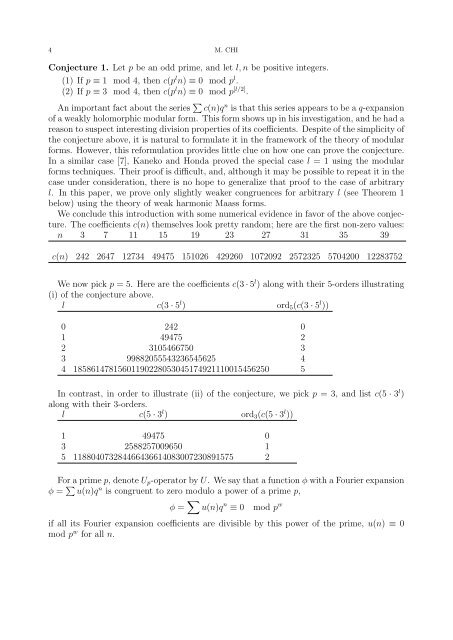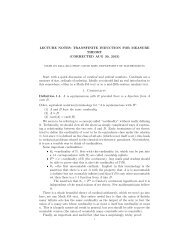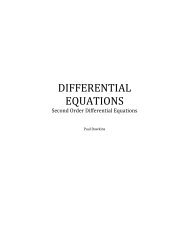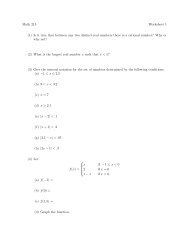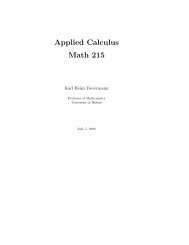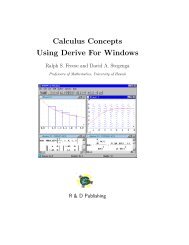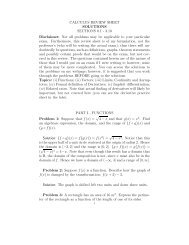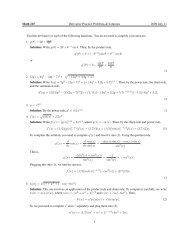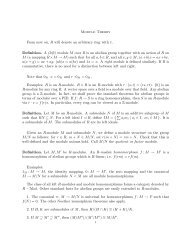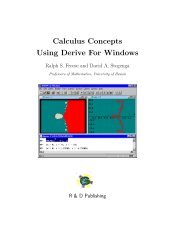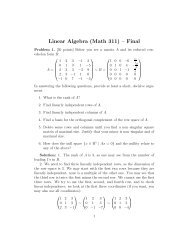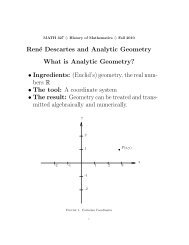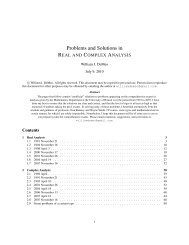MA thesis available - University of Hawaii
MA thesis available - University of Hawaii
MA thesis available - University of Hawaii
Create successful ePaper yourself
Turn your PDF publications into a flip-book with our unique Google optimized e-Paper software.
4 M. CHI<br />
Conjecture 1. Let p be an odd prime, and let l, n be positive integers.<br />
(1) If p ≡ 1 mod 4, then c(p l n) ≡ 0 mod p l .<br />
(2) If p ≡ 3 mod 4, then c(p l n) ≡ 0 mod p [l/2] .<br />
An important fact about the series c(n)q n is that this series appears to be a q-expansion<br />
<strong>of</strong> a weakly holomorphic modular form. This form shows up in his investigation, and he had a<br />
reason to suspect interesting division properties <strong>of</strong> its coefficients. Despite <strong>of</strong> the simplicity <strong>of</strong><br />
the conjecture above, it is natural to formulate it in the framework <strong>of</strong> the theory <strong>of</strong> modular<br />
forms. However, this reformulation provides little clue on how one can prove the conjecture.<br />
In a similar case [7], Kaneko and Honda proved the special case l = 1 using the modular<br />
forms techniques. Their pro<strong>of</strong> is difficult, and, although it may be possible to repeat it in the<br />
case under consideration, there is no hope to generalize that pro<strong>of</strong> to the case <strong>of</strong> arbitrary<br />
l. In this paper, we prove only slightly weaker congruences for arbitrary l (see Theorem 1<br />
below) using the theory <strong>of</strong> weak harmonic Maass forms.<br />
We conclude this introduction with some numerical evidence in favor <strong>of</strong> the above conjecture.<br />
The coefficients c(n) themselves look pretty random; here are the first non-zero values:<br />
n 3 7 11 15 19 23 27 31 35 39<br />
c(n) 242 2647 12734 49475 151026 429260 1072092 2572325 5704200 12283752<br />
We now pick p = 5. Here are the coefficients c(3 · 5 l ) along with their 5-orders illustrating<br />
(i) <strong>of</strong> the conjecture above.<br />
l c(3 · 5 l ) ord5(c(3 · 5 l ))<br />
0 242 0<br />
1 49475 2<br />
2 3105466750 3<br />
3 99882055543236545625 4<br />
4 18586147815601190228053045174921110015456250 5<br />
In contrast, in order to illustrate (ii) <strong>of</strong> the conjecture, we pick p = 3, and list c(5 · 3 l )<br />
along with their 3-orders.<br />
l c(5 · 3 l ) ord3(c(5 · 3 l ))<br />
1 49475 0<br />
3 2588257009650 1<br />
5 118804073284466436614083007230891575 2<br />
For a prime p, denote Up-operator by U. We say that a function φ with a Fourier expansion<br />
φ = u(n)q n is congruent to zero modulo a power <strong>of</strong> a prime p,<br />
φ = u(n)q n ≡ 0 mod p w<br />
if all its Fourier expansion coefficients are divisible by this power <strong>of</strong> the prime, u(n) ≡ 0<br />
mod p w for all n.


